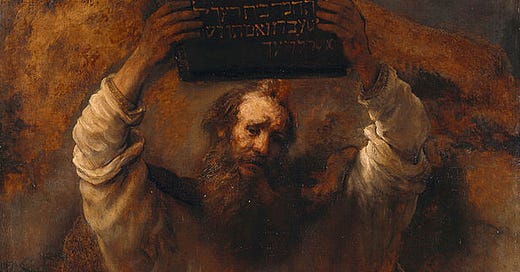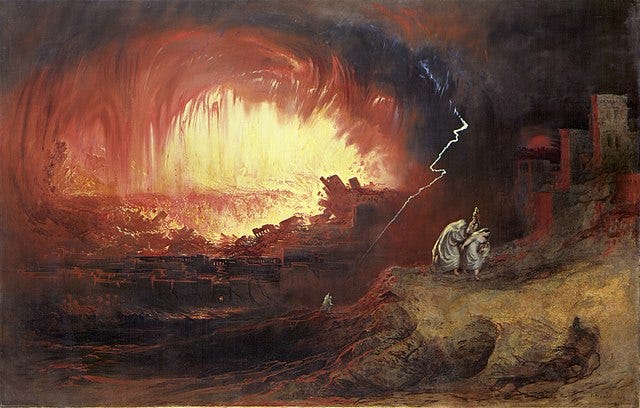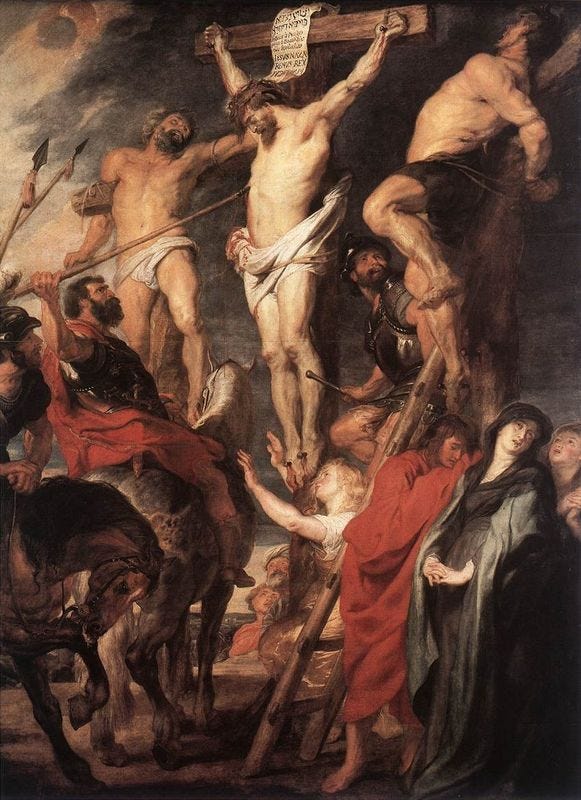“But I tell you, love your enemies and pray for those who persecute you, so that you may be children of your father in heaven.” Matt 5:44-45a
When beginning this newsletter, I had no expectations as far as what I ought to be writing about. I knew it would be a little bit of lifestyle, a little bit of food, or a little bit of anything that inspires me. Never did I expect to write regularly about my Christian faith, but as what I would hope most individuals might say, is that you can’t speak to me for very long without expressly hearing about it, “for his mouth speaks from the overflow of the heart.”
As a Christian, it is not my responsibility to adjudicate the lives of those who live outside the church of Christ, according to Paul spoken in 1 Corinthians 5: 9-13, but it is my responsibility within the believing body of Christ to encourage, correct, and examine the lives of those who claim themselves believers and held to the word of God. These particular writings and ramblings are by no means for everyone, and I am grateful to those who take the time to consider them. However, if you have no interest in these topics, I certainly understand. My hope is simply that to the reader who considers these words, might be comforted, convicted, or made conscious of their claim to Christ.
When considering the life of a Christian, and how we may advocate for the life found within a believer, I would strongly consider the trait of "Intercessor."
This particular role is found as a common and quite powerful trait within a true believer seeking to be pleasing to the Father. Though there are multiple examples of this, there are three specific examples found within scripture that I will speak from today: Abraham, Moses, and Christ Jesus.
Abraham
Abraham is often considered the father of the faith when it comes to Christianity. He was called out by God, to follow Him, and it was Abraham’s faith in God that was credited to him as righteousness (Genesis 15:6). If it were not for the faith of Abraham, and God’s work in his life, we would not be christians as we are today. Where I would like us to look, is Abraham’s actions as an intercessor between God and men in Genesis 18. In Genesis 18, the Lord appeared to Abraham at the oaks of Mamre. After having spent time with the Lord, they get up and begin to walk in order to be sent off. Along this walk, the Lord makes a great promise to Abraham, He distinctly promises him that He will make a powerful nation out of him, and that all the other nations will be blessed through him. After this statement however, the Lord changes focus to the cities of Sodom and Gomorrah nearby. The Lord begins to speak of the extreme nature of the sin within these cities. After saying this, the Lord, who had been accompanied by two servants at this time, sent these servants into the city, while Abraham remained there with the Lord.
At this time, Abraham steps forward to speak with God saying, “Will you really sweep away the righteous with the wicked? What if there are fifty righteous people in the city? Will you really sweep it away instead of sparing the place for the sake of the fifty righteous people who are in it? You could not possibly do such a thing: to kill the righteous with the wicked, treating the righteous and the wicked alike. You could not possibly do that! Won’t the Judge of the whole earth do what is just?”
Then the Lord replied to him, “If I find fifty righteous people in the city of Sodom, I will spare the whole place for their sake.”
Then Abraham responds, “Since I have ventured to speak to my Lord—even though I am dust and ashes— suppose the fifty righteous lack five. Will you destroy the whole city for lack of five?”
And God replies, “I will not destroy it if I find forty-five there.”
This exchange then continues on between Abraham and the Lord as Abraham argues for the sparing of these cities down to the amount of ten righteous individuals.
Here’s what I want us to draw from this.
Abraham was just told by the Lord, that he would be made a great nation or that his name, simply put, would be made in lights. The natural disposition of man, would often times be caught up in this moment, thinking about oneself, and all the great things that they will be able to do once they have the power to do so. They may dream of a rich lifestyle, endless friends and festivities, or even ways in which to get revenge on those who have caused them suffering in the past. However, opposite of that, Abraham commits his focus on the people within Sodom and Gomorrah. He not only doesn’t quickly consider these promises that the Lord just spoke, but he also threatens the loss of his promised personal greatness by arguing with the Lord about the people within these cities and His actions towards them. Abraham, in his faith, interceded on behalf of those whom the Lord might wipe out.
At this moment, the people within the walls of this city offered little to no personal gain for Abraham. He had little justified reasoning to act on their behalf by placing himself in the way of the Lord’s judgement. His nephew Lot, did live there however, but he did not speak up specifically for him, but rather for all righteous individuals within the city in hopes that they might be saved. Abraham interceded for the righteous not to be swept away with the wicked.
Moses
Moses, who came after Abraham, delivered the ten commandments and law of God to the Israelite people while wondering in the wilderness, also stood to intercede between God and His right judgement. In Exodus 32: 7-14 we see this depiction.
The LORD spoke to Moses: “Go down at once! For your people you brought up from the land of Egypt have acted corruptly. They have quickly turned from the way I commanded them; they have made for themselves an image of a calf. They have bowed down to it, sacrificed to it, and said, ‘Israel, these are your gods, who brought you up from the land of Egypt.’” The LORD also said to Moses, “I have seen this people, and they are indeed a stiff-necked people. Now leave me alone, so that my anger can burn against them and I can destroy them. Then I will make you into a great nation.” But Moses sought the favor of the LORD his God: “LORD, why does your anger burn against your people you brought out of the land of Egypt with great power and a strong hand? Why should the Egyptians say, ‘He brought them out with an evil intent to kill them in the mountains and eliminate them from the face of the earth’? Turn from your fierce anger and relent concerning this disaster planned for your people. Remember your servants Abraham, Isaac, and Israel — you swore to them by yourself and declared, ‘I will make your offspring as numerous as the stars of the sky and will give your offspring all this land that I have promised, and they will inherit it forever.’” So the LORD relented concerning the disaster he had said he would bring on his people.
I embolden some of these words to bring attention to them. Once again we see, the Lord God tells Moses, that He will make a great nation of Moses. Up to this point in the wilderness journey of the Israelites, they had been impatient, immoral, and cumbersome to the life Moses. By no means would it not be an easy assessment for Moses to make in saying such things as “they get what they deserve” or “I’ve been given my due this day.” However easy that would have been, instead Moses stops and intercedes on behalf of these people. How undoubtably sure, a man’s natural disposition would be to feel great joy in the fact that the Lord God, creator of heaven and earth, would make his name great. Yet, we see once again, just as Abraham did, and now so also Moses, who stood in-between the living God and sinful man, intercedes on behalf of such stiff-necked individuals, who undoubtably deserved the just judgement of the Lord.
Christ Jesus
I shouldn’t have to say much of Christ here, for if you’re a believing Christian, you ought to have been made known the life and works of Christ. However, I will say a few things simply as a reminder. Out of all three of these individuals, Christ was and is indeed the only perfect living being. Though both Abraham and Moses were great men of faith, they still failed within times to live a life perfectly holy to that which Christ lived. As believers, we do not always seek to align our lives with that of Abraham and Moses, but we do always look to align our lives with that of Christ, but we can certainly find patterns of faith filled actions within the lives of men that are tied to Christ, and even greater, these patterns point us to the works and life of Christ Jesus. Let us always remember when looking to biblical characters as examples of the faith, that first and foremost we do not trust in the works of man, but rather instead trust fully only in the work of Christ, and let us seek to emulate those same works within our own lives, pointing others to Jesus. I write this simply to encourage the believer to seek affirmation of the character’s actions of faith by comparing them to the actions of Christ. If it seems a common theme, both with Christ and the forefathers of our faith, then it would often be safe to say, we might be encouraged to pursue these traits as well. This being said, let me now speak of Christ’s work of intercession.
Now, while the bible speaks plainly and often of Christ’s work as an intercessor between us and a just God, I would like to draw attention to one particular moment of intercession while Christ was on that horrendous cross.
Luke 23: 34 Then Jesus said, “Father, forgive them, because they do not know what they are doing.”
I want to draw the attention of the believer to this particular circumstance, because of the focus of Christ’s sight. Just as Abraham and Moses were not concerned with themselves once the Lord promised them greatness, how much greater is Christ’s focus when He is strung up by nails in the most appalling manner; beaten, broken, and naked, and yet, He commits himself to asking that the Father would forgive the people who put Him there. Of all people, Christ has more excuse and reasoning to be concerned first and foremost with his own position, than anyone else has to be concerned with theirs. However, rather than live in the grueling punishment that was the cross, He still actively took time to intercede through prayer on behalf of those around Him. Another aspect worthy of consideration within this moment, is that in many cases it is easy to act for those who would be of usefulness to you, but we believe in a perfect and complete God, who lacks nothing. When Christ intercedes, He intercedes for those that add nothing to Him. There was nothing of His gain for His sacrifice for these people. Though that was, He did not stop acting as our intercessor when on that cross. This is the trait of the King that we serve.
Believer, I encourage you, intercede on behalf of others. Whether that intercession is through prayer or personal action. This is a common character trait of those who call themselves believers of God, and we are called to live a life of faith that is active in the reflection of Christ. Seek opportunities to take upon yourself the debts of others, all while pointing others to the greatest debt paid by Christ, not so you can be seen a saint, but rather Christ’s work in you might be glorified. It was not simply Christ’s words that changed people, but the inclusion of His actions. Pray and act on behalf of the righteous. Pray and act on behalf of those who bring suffering to your life. Pray and act on behalf of others that add nothing to you. Christ Jesus died for us, despite the fact that we were still sinners, His enemies, and yet He continued to intercede on our behalf with the Father in heaven to save us from our sins, and reconcile us once again to the Holy and Living God.





